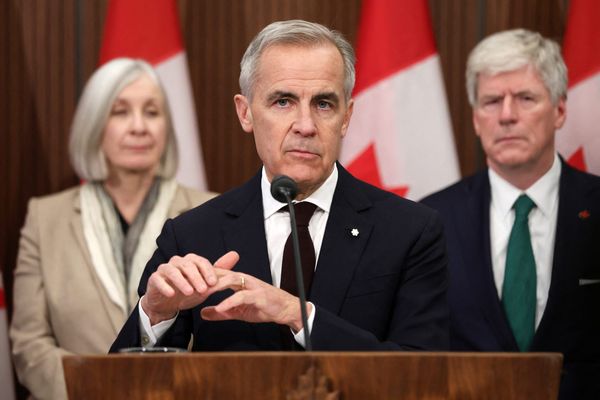
Americans are feeling rattled about the state of the economy. Donald Trump has batted away question after question from reporters on concerns over higher prices, just a year after he won an election promising to bring down costs.
While the White House has tried to reduce concern, floating tariff-funded $2,000 stimulus checks and removing import levies on certain agricultural imports, many consumers remain anxious.
Preparing for the holiday season, and bracing for the spending it often demands, Guardian readers across the US expressed apprehension – and explained how they plan to spend – in this economy. Many said the higher cost of necessities, like groceries, was imposing on their ability to buy gifts for family and friends.
“I love giving people gifts,” said Grace Brown, 34, of Charlotte, North Carolina. “I’m a person that pays attention all year and will keep notes in my phone if someone mentions something in July they may want.”
But this year is different. As prices have climbed over the last year, Brown said that her budget for gifts has shrunk. Things already feel squeezed: she and her fiance are already limiting eating out, and have agreed they won’t exchange gifts with each other this holiday.
“Prices for everything have gone up,” Brown said. “It’s kind of hard to have luxuries.”
Collection of key pricing data was halted during the shutdown, so it’s unclear how much higher prices have been rising. In September, the latest available reading, prices went up 3%, compared with 2.3% in April.
Regardless of the official data, consumers feel like prices have been climbing. On Tuesday, the Conference Board reported that consumer confidence had fallen to its lowest level since April, when Trump first announced his full slate of tariffs. The University of Michigan’s Surveys of Consumers, another measure of consumer sentiment, similarly showed drops in confidence after the summer.
“Being on a fixed income, we have had to cut way back on our spending for the holiday,” said Jeffrey Larimore, 68, of Caldwell, Idaho. “We had enough disposable income to go out to dinner, take weekend trips and spoil [my granddaughters]. Since the tariffs have raised the cost of living, we have cut out all of that.”
Ryan, a retired law enforcement officer in Texas, who wished to withhold his last name, said his family “can barely put food on the table” let alone do holiday shopping for his young children.
“I’m scrambling to find some way to preserve some aspect of magic for them,” he said. “I spent my life in service to my country. What he [Trump] has done in less than a single year breaks my heart.”
Recent surveys indicated that Americans are set to cut back on holiday shopping this year. Deloitte estimated that spending could be down 4% compared with last year, while the National Retail Federation said that after hitting a record high last year, the amount of money Americans are planning to spend this year is down 1.3%.
In addition to prices going up, more Americans are concerned about the labor market. While expectations of unemployment dropped after Trump’s election, it has been climbing up over the last year. This sentiment tracks with the slow rise in unemployment, which was 4.4% in September – the highest it’s been since October 2021. For many, this means that higher prices aren’t the only concern.
“My homeowner’s insurance is up, 2026 health insurance is up, property taxes are up for 2026,” said Sarah Tenbensel of Minneapolis. “I may need a second job very soon.”
Shari Dunn, 57, of Oregon, said that in addition to prices going up, “there is fear regarding employment and contacts”. “It’s more than just tariffs – it’s everything. The instability and fear,” she said.
Dunn said she is participating in the economic boycott taking place over the Black Friday shopping holiday, one of a handful of consumer boycotts that have been organized since Trump started his second term.
For some, this past year has meant opting out of the economy in frustration with national politics. Linda McKim Bell, 79, of Portland, Oregon, said that she has tried not to buy anything new since Trump took office.
“I have shopped all year at online thrift stores for my family gifts,” she said. “I am making the rest of our holiday gifts: orange marmalade and homemade pastries make great gifts. Will continue to buy items that are used as much as possible.”
Brown said that even though she and her fiance have agreed not to exchange gifts, she may make a trip to Asheville, North Carolina, and support local artists there as the community continues to recover from Hurricane Helene.
“Whenever we have money to spend, we try to spend it there with small businesses,” Brown said. “One thing I just remember from high school is my teacher would always tell us ‘you vote with your dollars’.”







